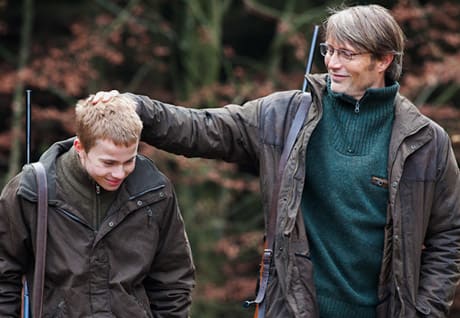Having already tackled social issues like drug addiction (Submarino) and gun control (Dear Wendy), ex-Dogme proponent Thomas Vinterberg's The Hunt treads familiar stylistic and thematic ground in detailing the social anarchy that occurs after a Kindergarten teacher is wrongfully accused of child molestation.
While bleak and unflinching in its depiction of human nature and herd mentality, it demonstrates mainly that practice does eventually make perfect (or better), at least in the realm of auteur theory, where Vinterberg has finally matched the intensity of his shocking late '90s exploration of a severely dysfunctional family, The Celebration.
Stepping away from the family unit to assess the nature of community, this distressing, but grounded, drama finds the affable Lucas (Mads Mikkelsen) working at the local kindergarten where his best friend's (Thomas Bo Larsen) daughter, Klara (Annika Wedderkopp), attends.
Popular with the children and his peers — colleague Nadja (Alexandra Rapaport) makes it clear that she's open to coital shenanigans — he lives a moderately idyllic life, save for a custody battle with his ex-wife over his teenage son.
Once accused of exposing himself to Klara, things shift gears with an unembellished naturalism that makes everything unfolding that much more horrifying. While the fact that the entire town turns on Lucas at the drop of a hat isn't surprising, the passivity and sporadic rage they demonstrate shock through sheer believability
People don't immediately pick up pitchforks and storm his house, rather they engage with him in a haze, still conflicted by their perceptions and the social "hunting" expectation, defaulting to violence and hostility primarily when other eyes are on them.
In deconstructing the artifice of a community, suggesting that people will gang up on the weak at any opportunity, Vinterberg has presented us with an unflattering mirror of our social behaviour. The strength of this impressively rendered film lies in its ability to overcome the many defenses and objections of those that like to tell themselves that people are inherently good without acknowledging intrinsic human flaws and instincts.
Reflection and self-evaluation are forced through reality unhindered by twee idealism.
(Mongrel Media)While bleak and unflinching in its depiction of human nature and herd mentality, it demonstrates mainly that practice does eventually make perfect (or better), at least in the realm of auteur theory, where Vinterberg has finally matched the intensity of his shocking late '90s exploration of a severely dysfunctional family, The Celebration.
Stepping away from the family unit to assess the nature of community, this distressing, but grounded, drama finds the affable Lucas (Mads Mikkelsen) working at the local kindergarten where his best friend's (Thomas Bo Larsen) daughter, Klara (Annika Wedderkopp), attends.
Popular with the children and his peers — colleague Nadja (Alexandra Rapaport) makes it clear that she's open to coital shenanigans — he lives a moderately idyllic life, save for a custody battle with his ex-wife over his teenage son.
Once accused of exposing himself to Klara, things shift gears with an unembellished naturalism that makes everything unfolding that much more horrifying. While the fact that the entire town turns on Lucas at the drop of a hat isn't surprising, the passivity and sporadic rage they demonstrate shock through sheer believability
People don't immediately pick up pitchforks and storm his house, rather they engage with him in a haze, still conflicted by their perceptions and the social "hunting" expectation, defaulting to violence and hostility primarily when other eyes are on them.
In deconstructing the artifice of a community, suggesting that people will gang up on the weak at any opportunity, Vinterberg has presented us with an unflattering mirror of our social behaviour. The strength of this impressively rendered film lies in its ability to overcome the many defenses and objections of those that like to tell themselves that people are inherently good without acknowledging intrinsic human flaws and instincts.
Reflection and self-evaluation are forced through reality unhindered by twee idealism.
